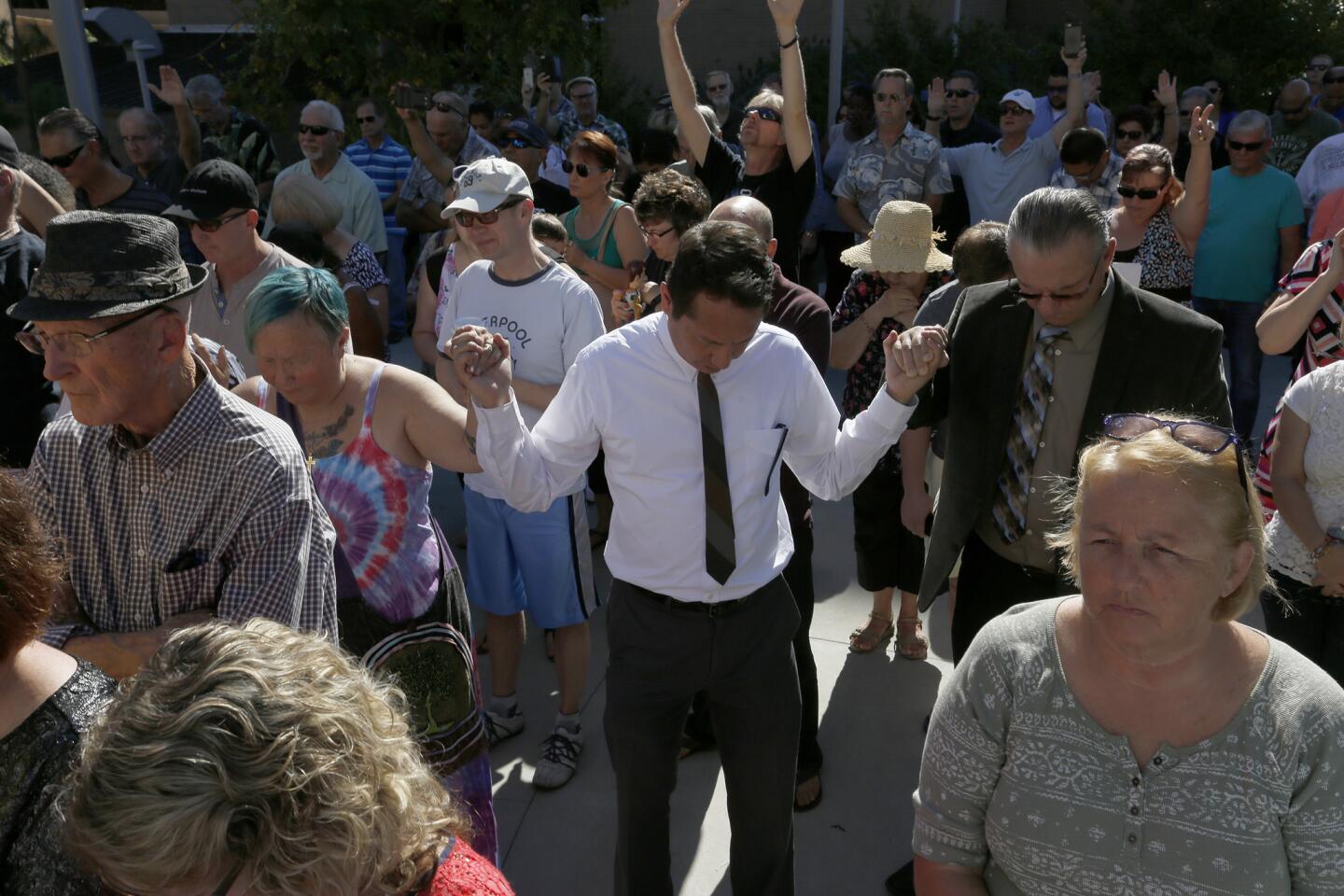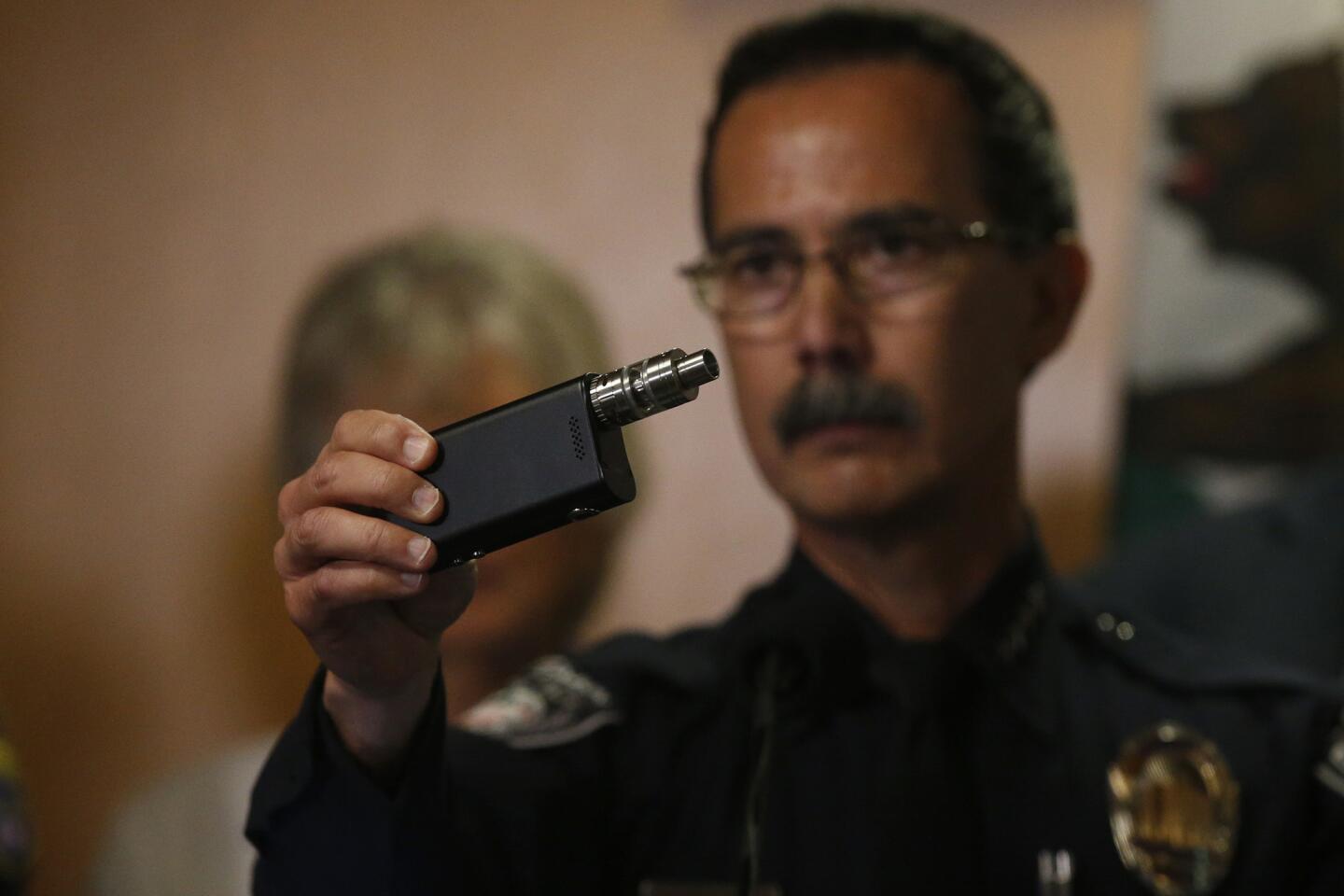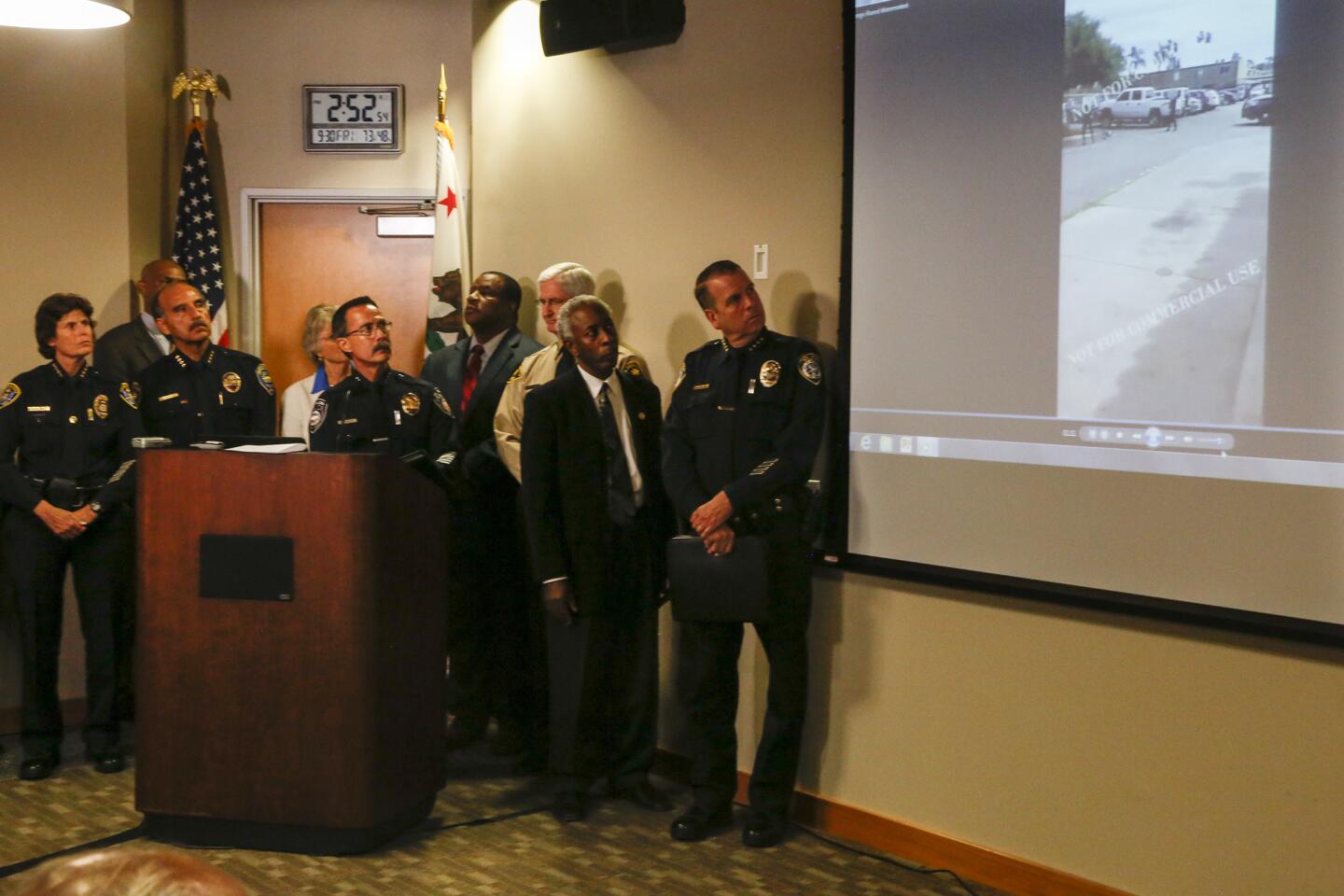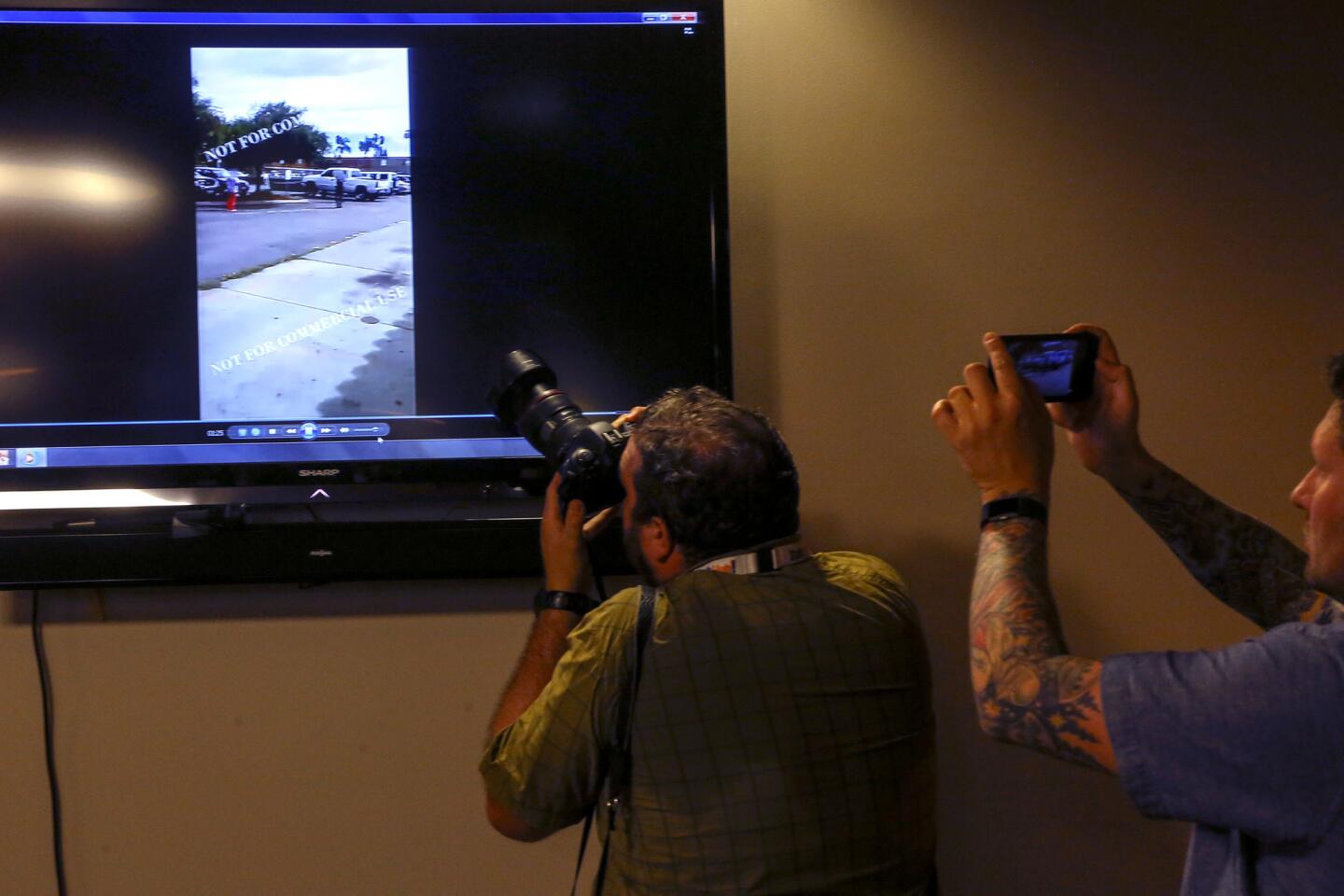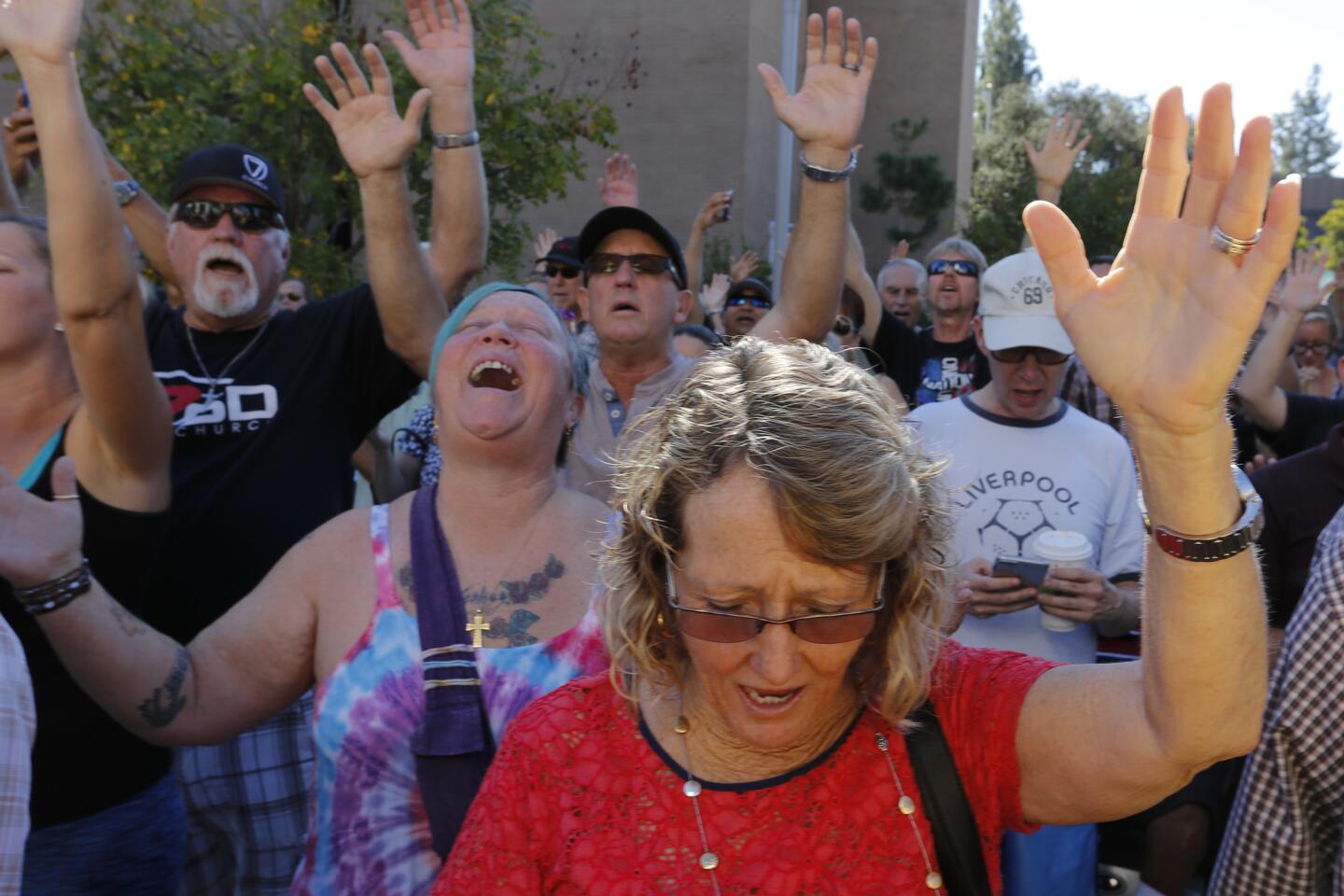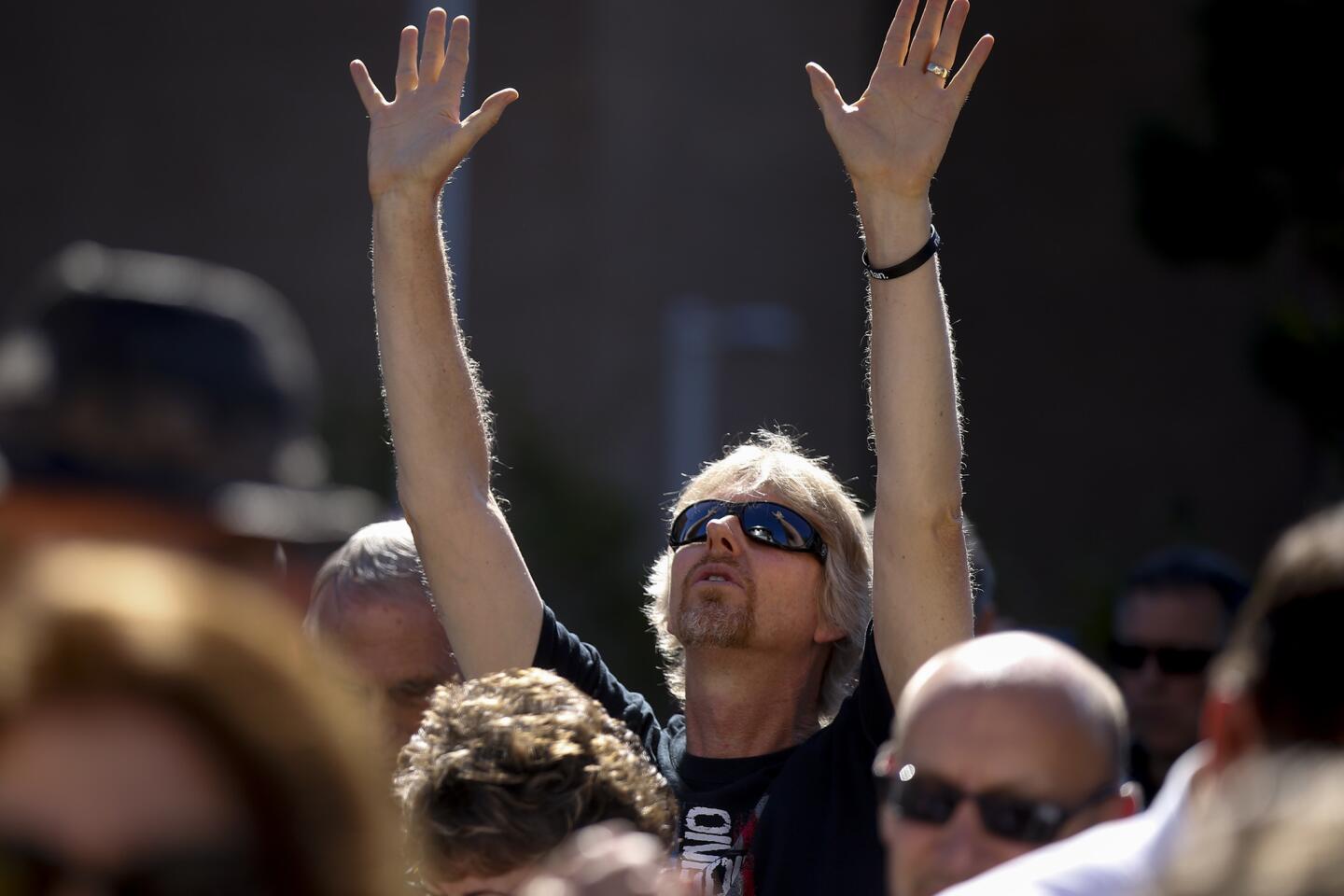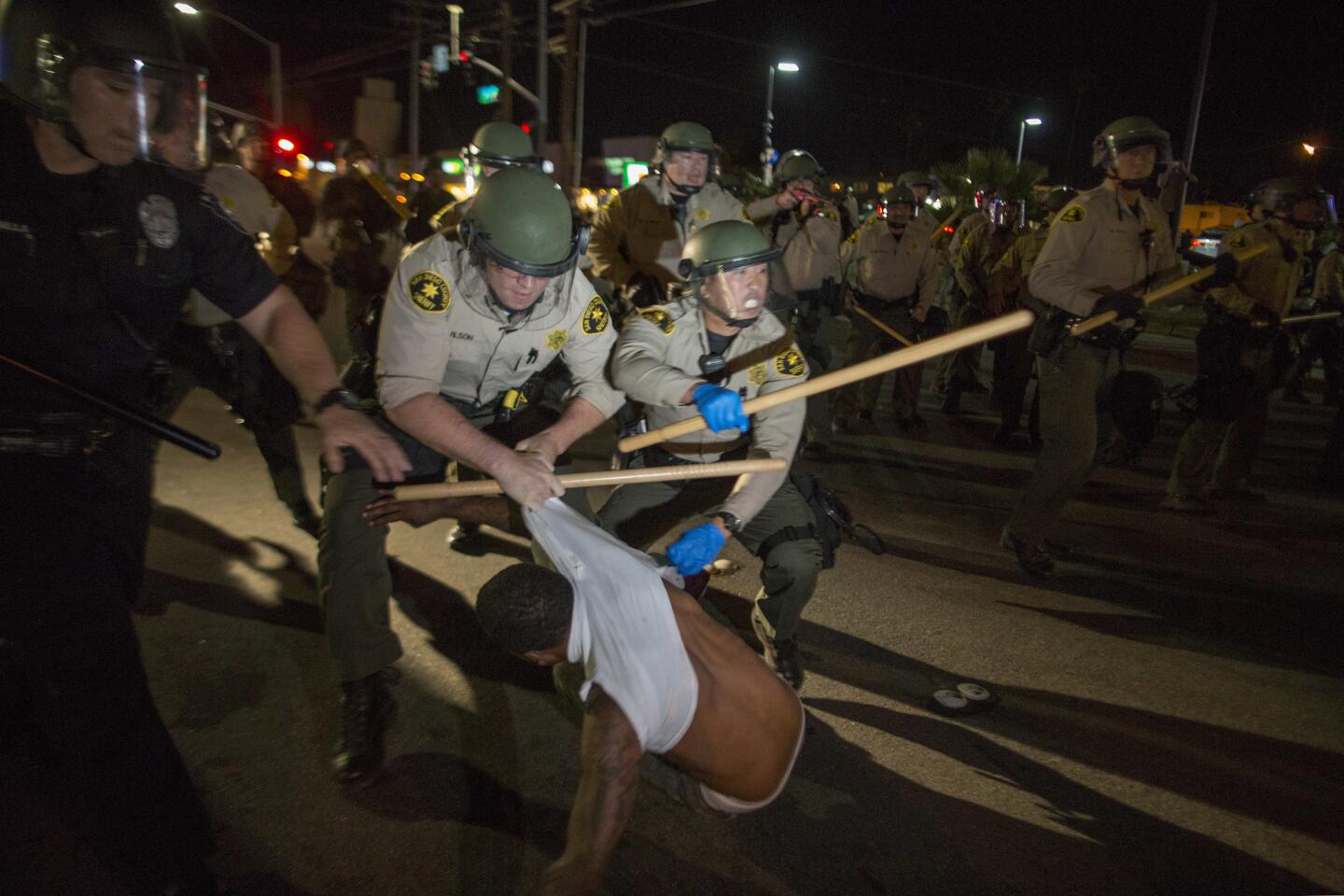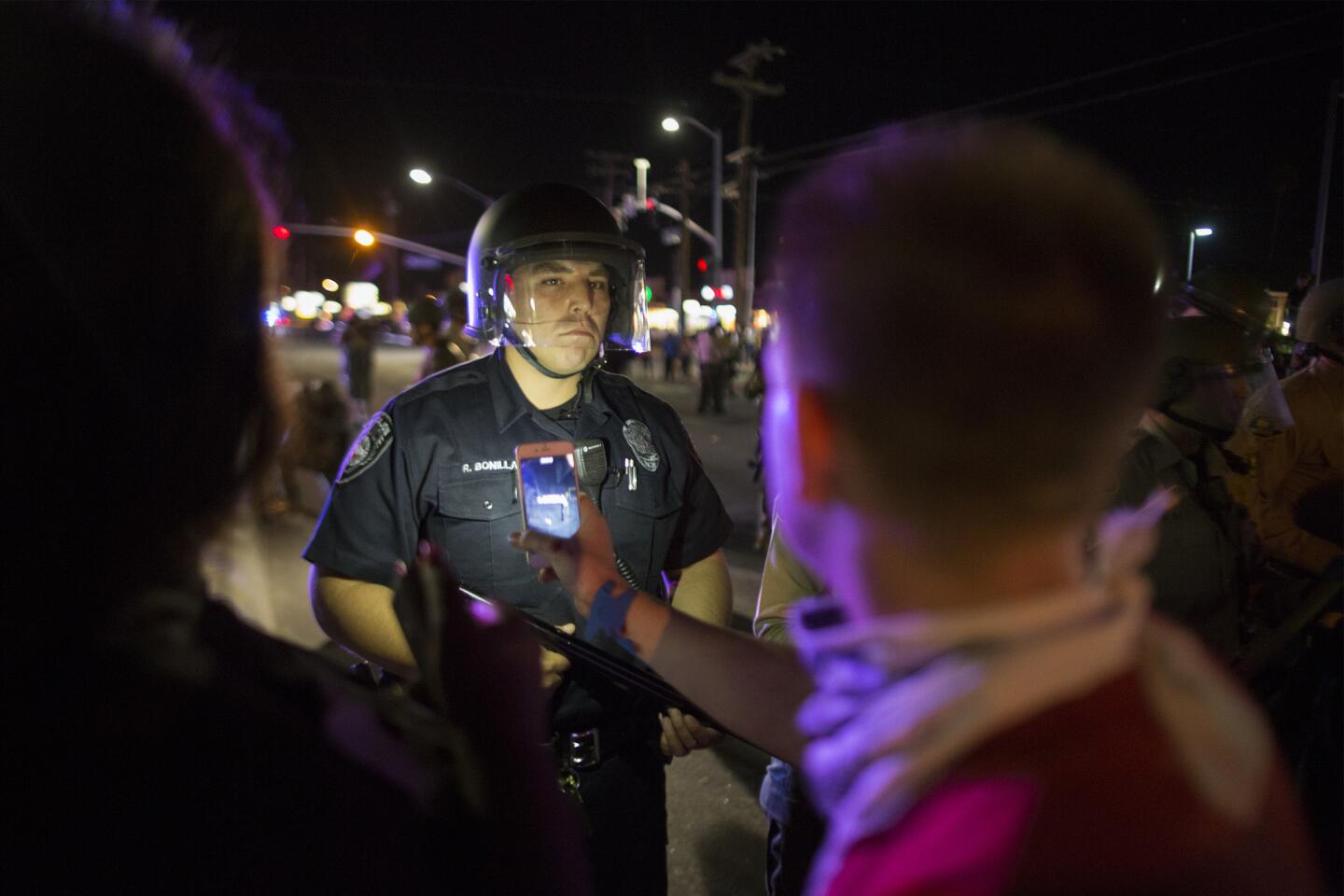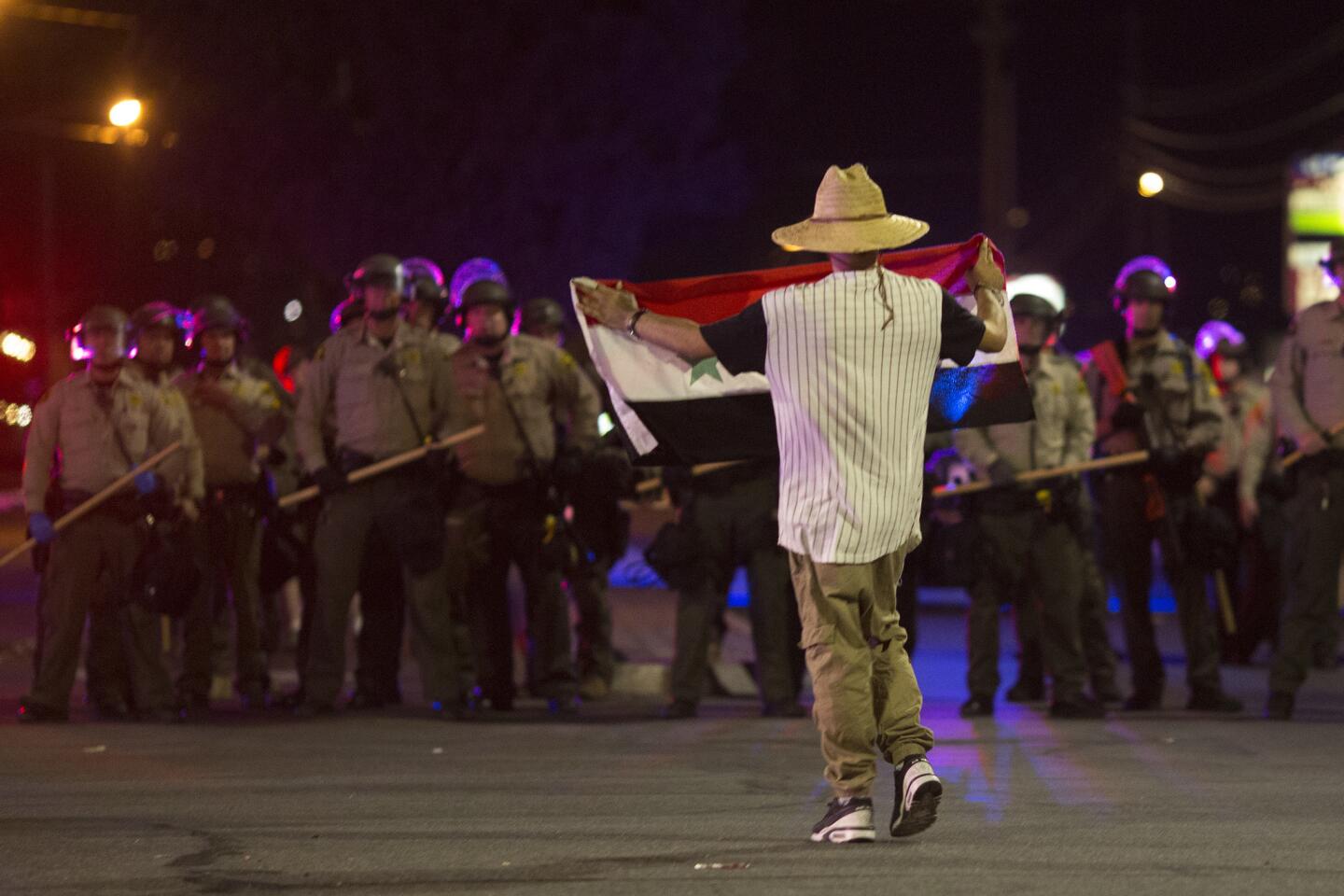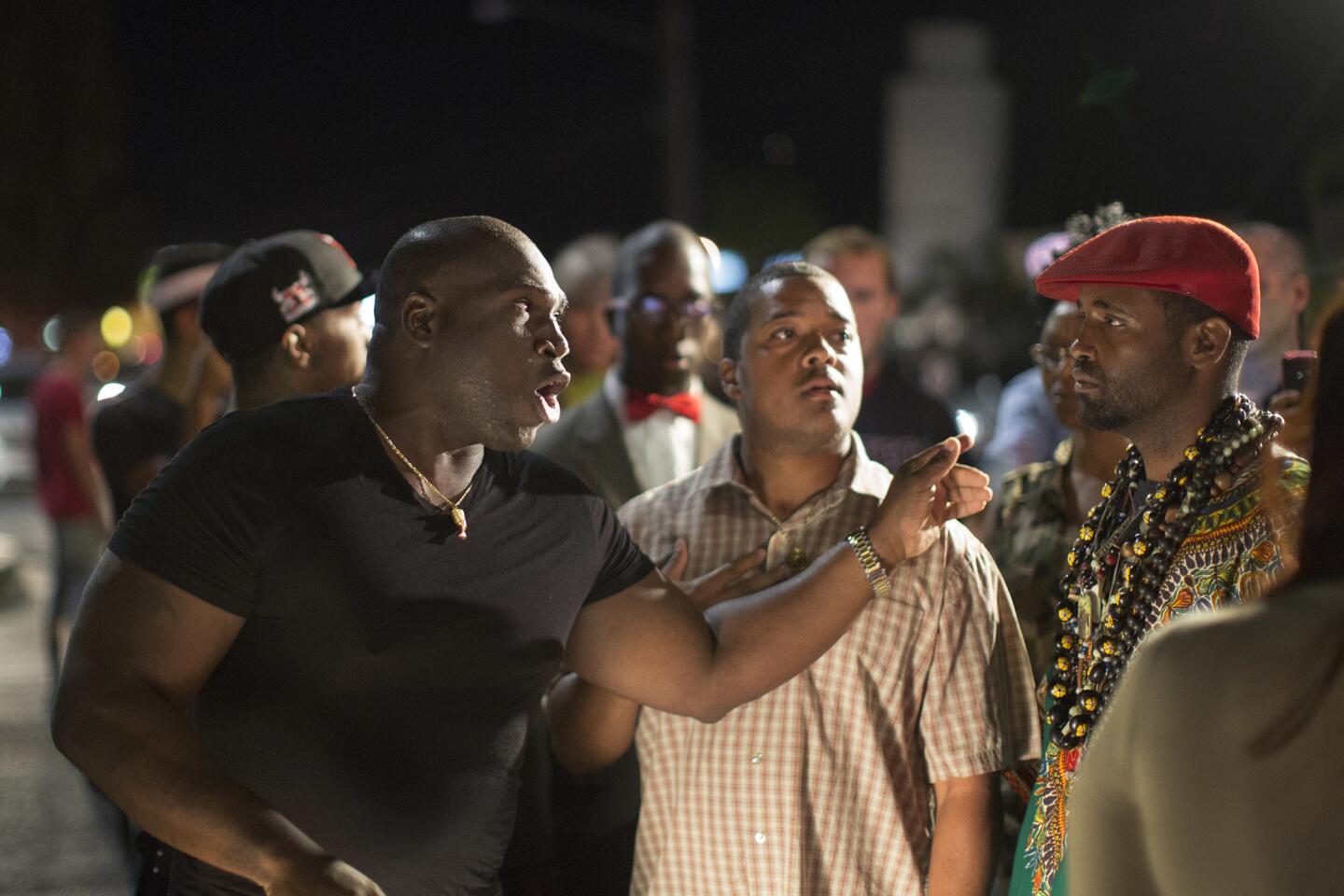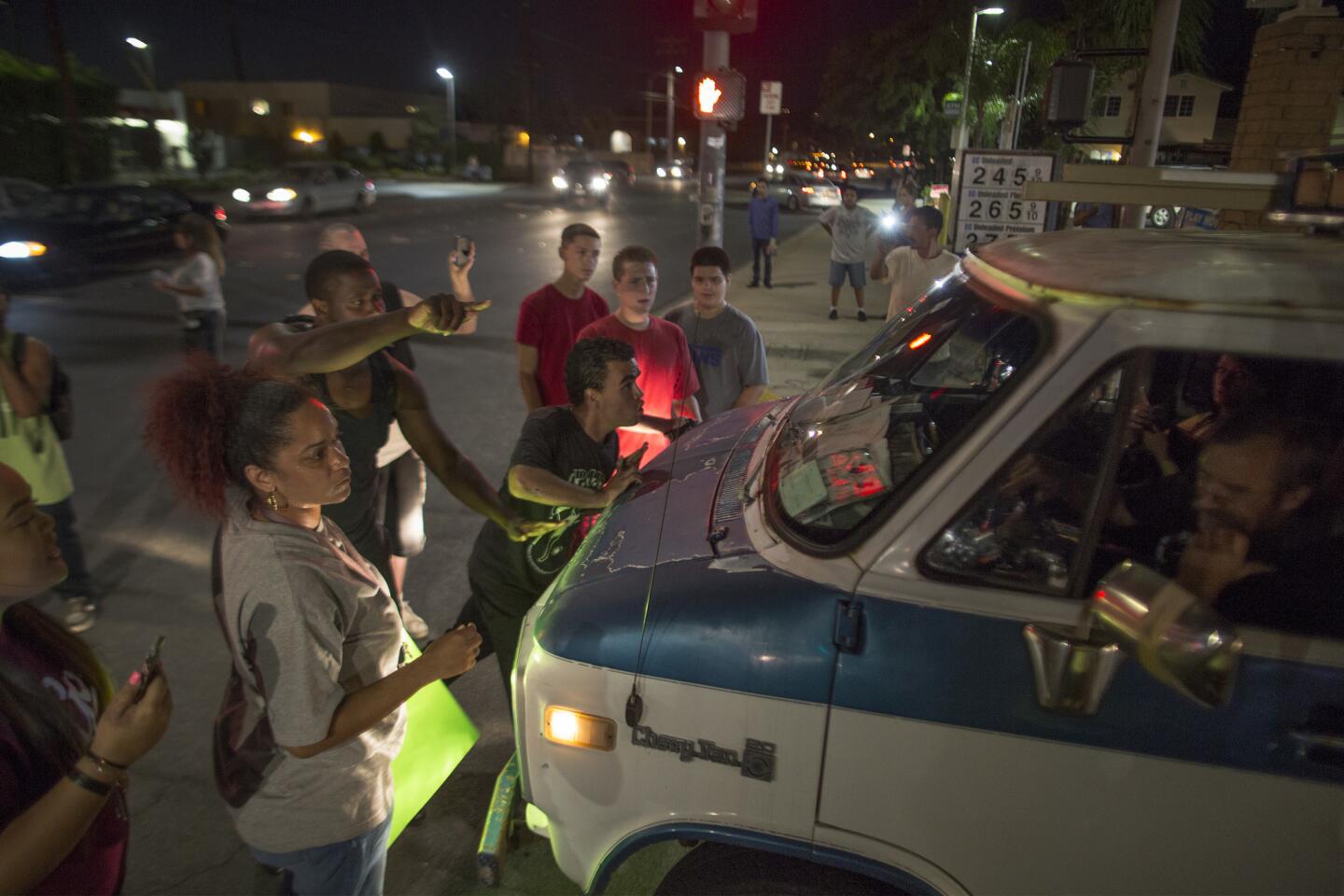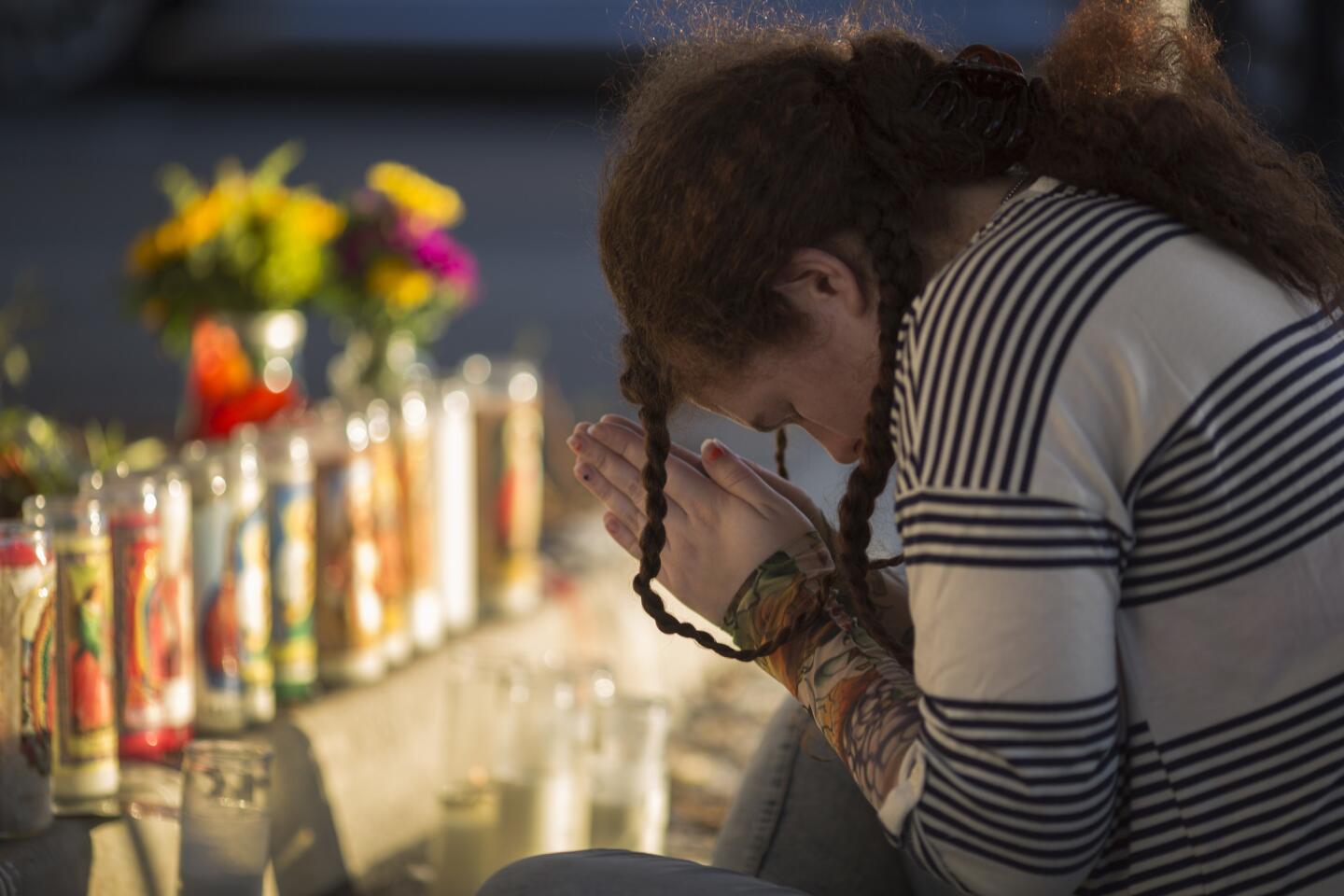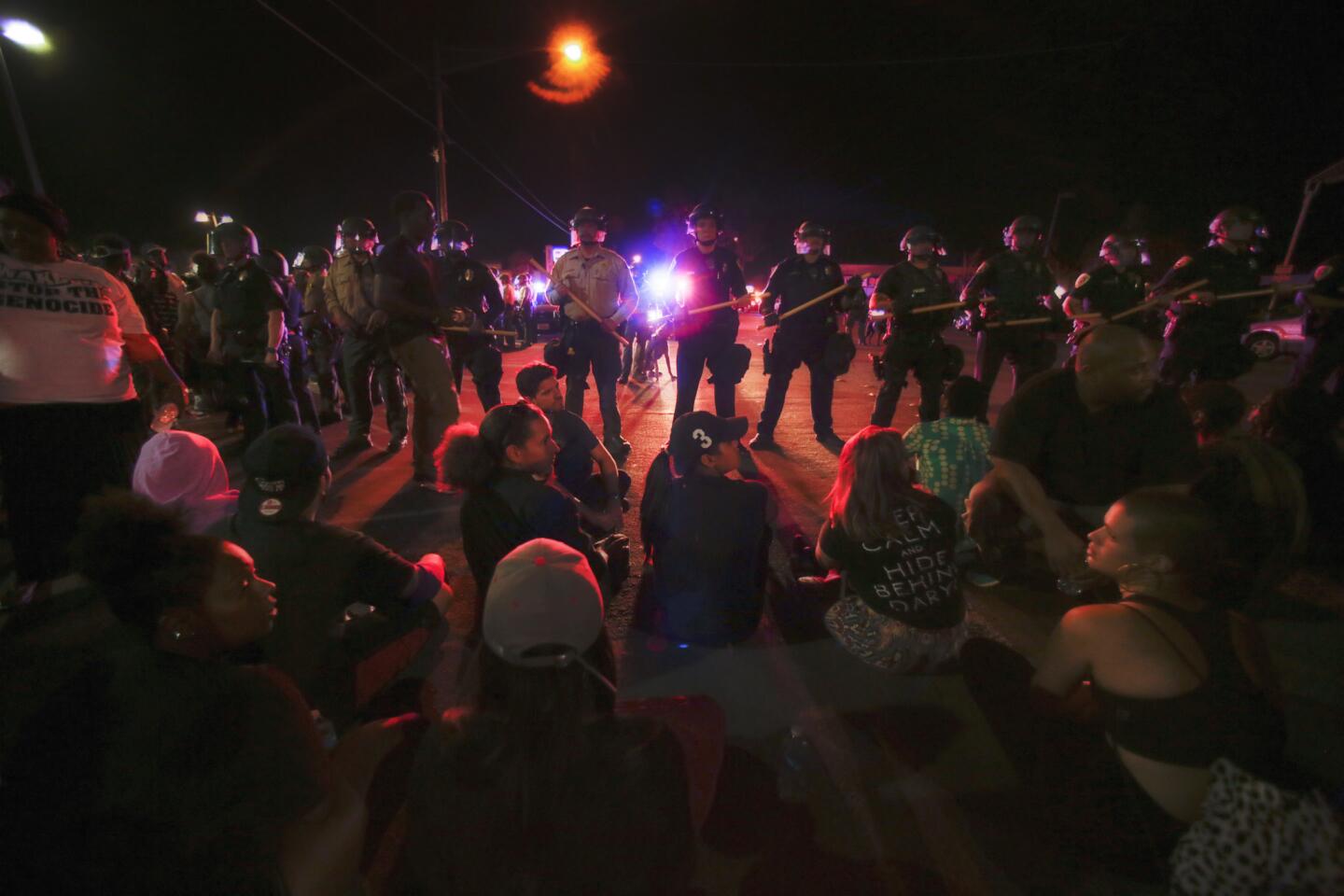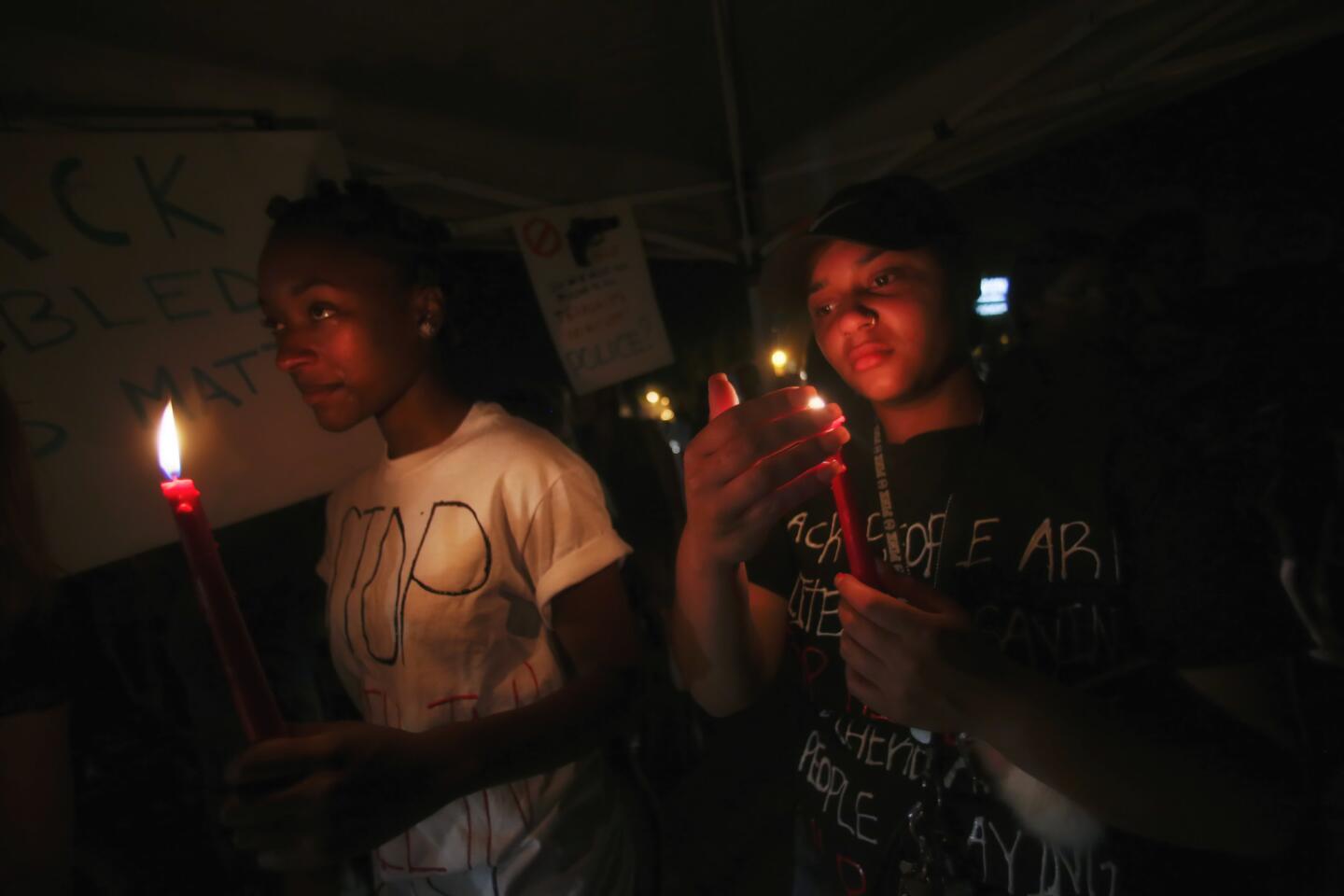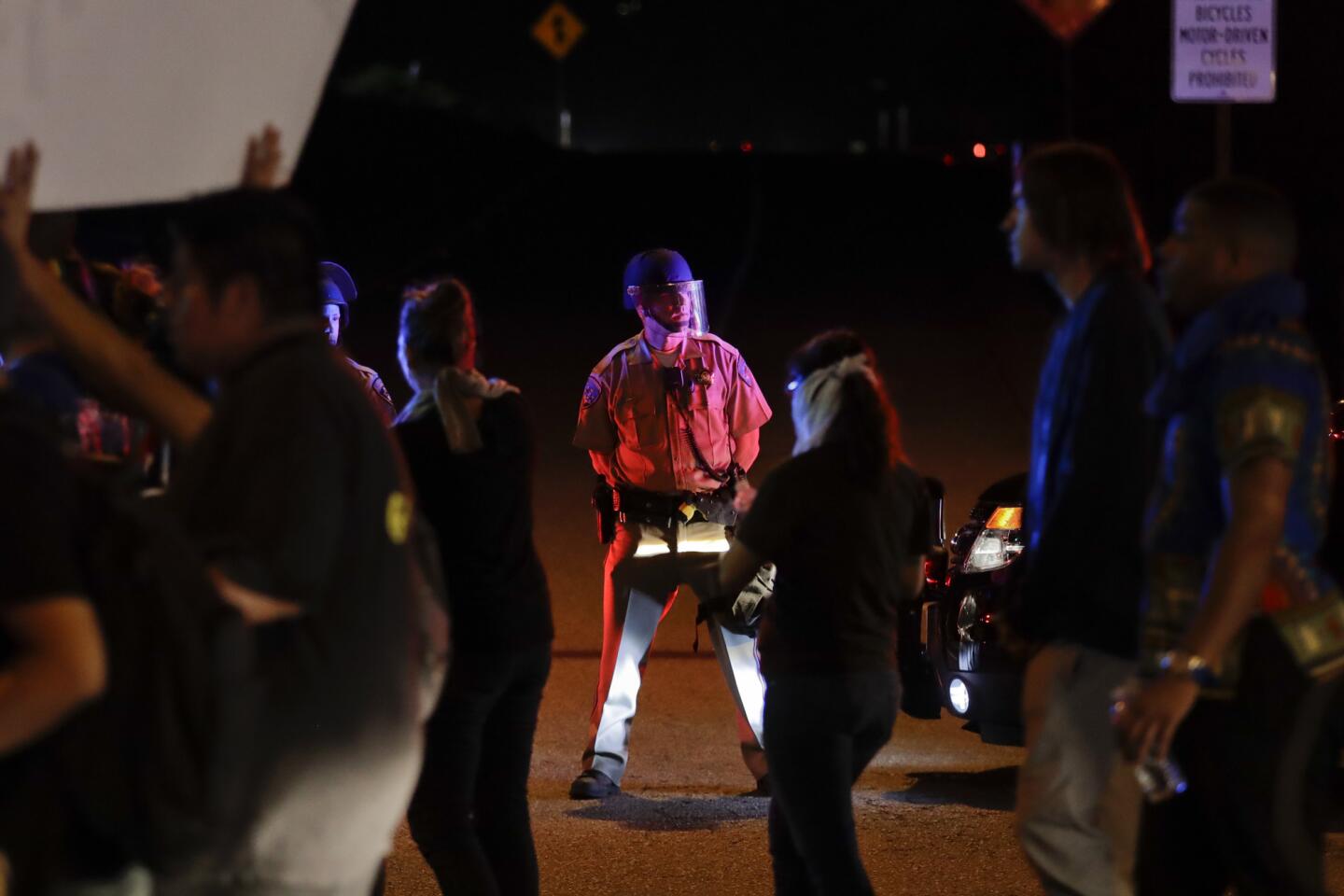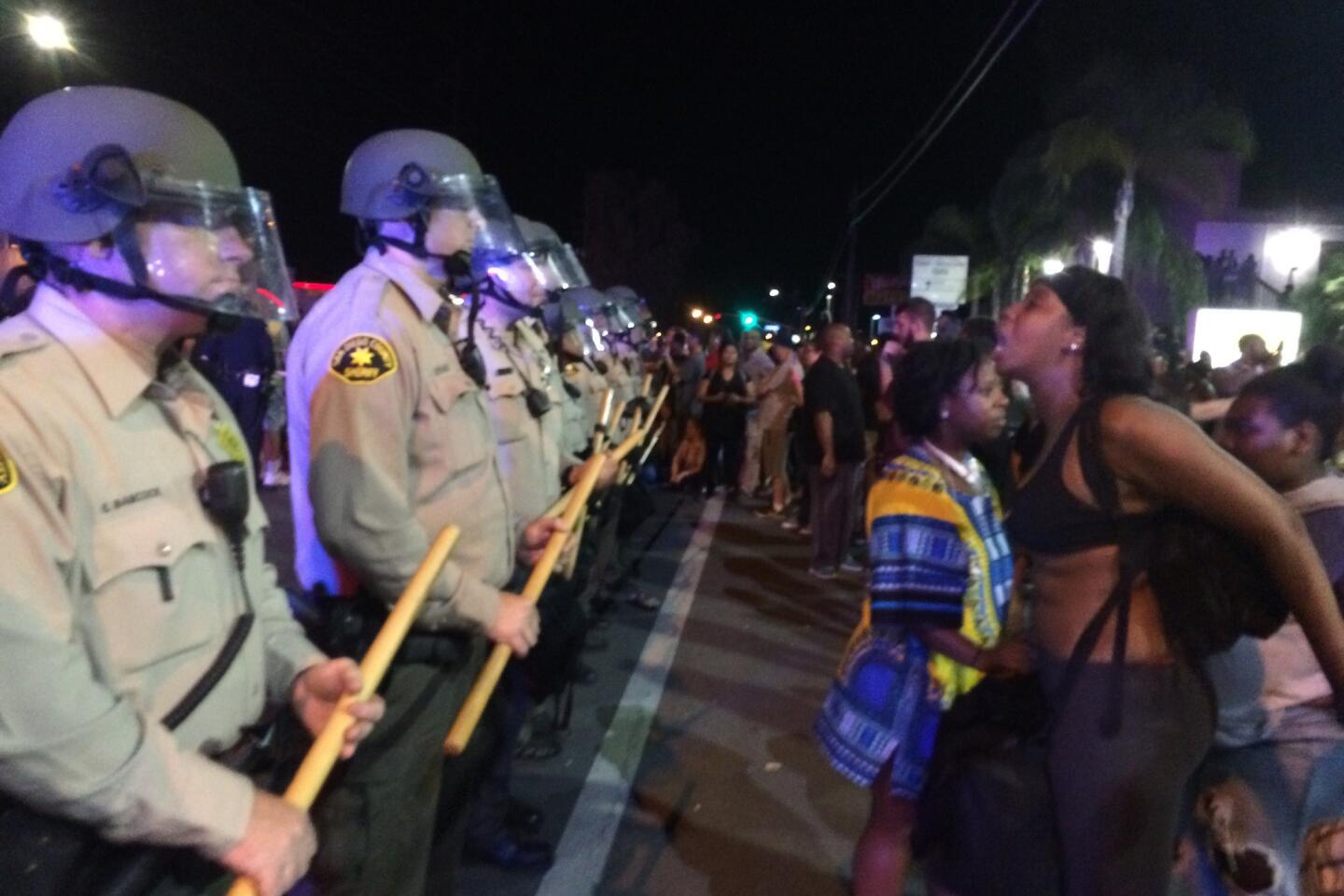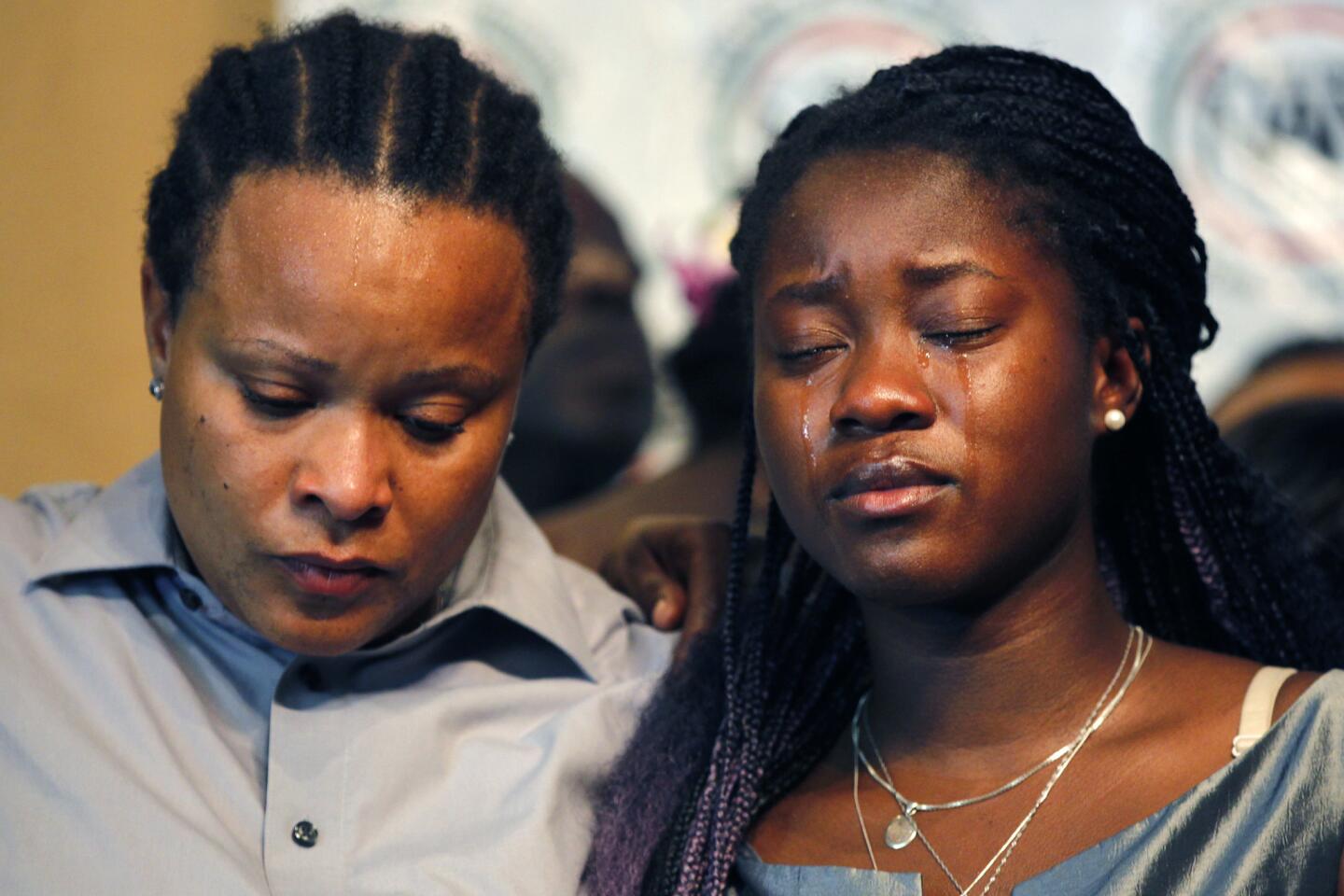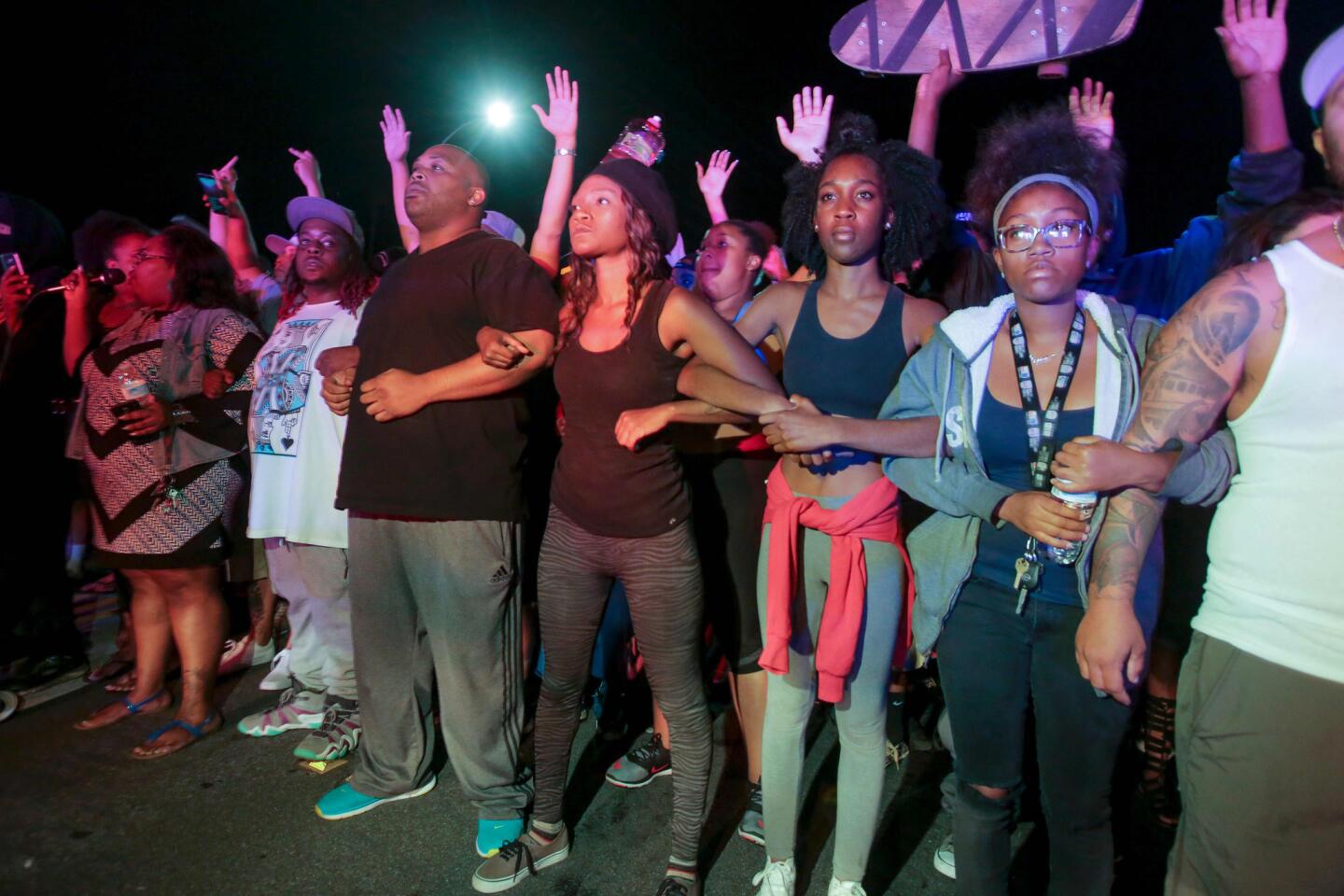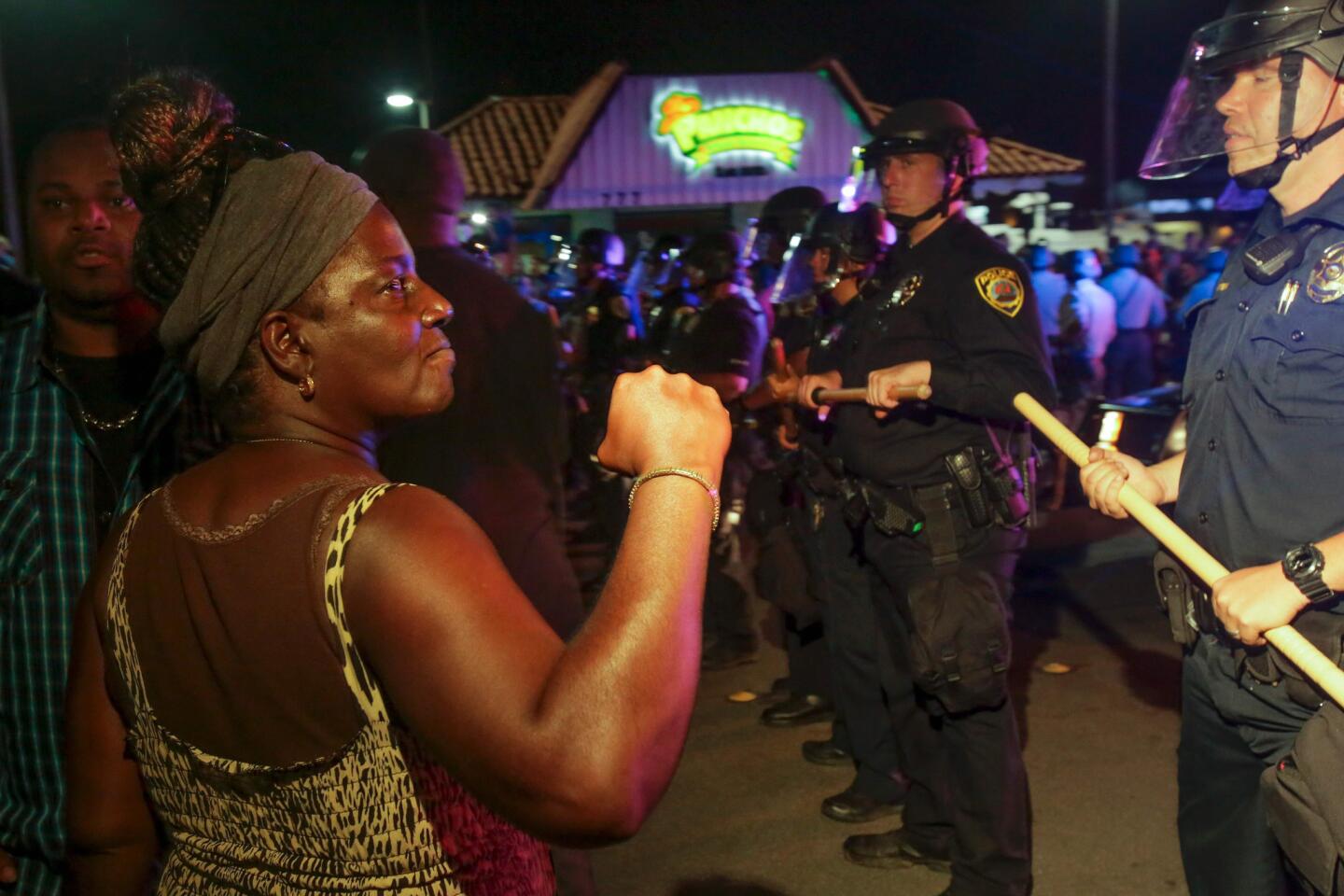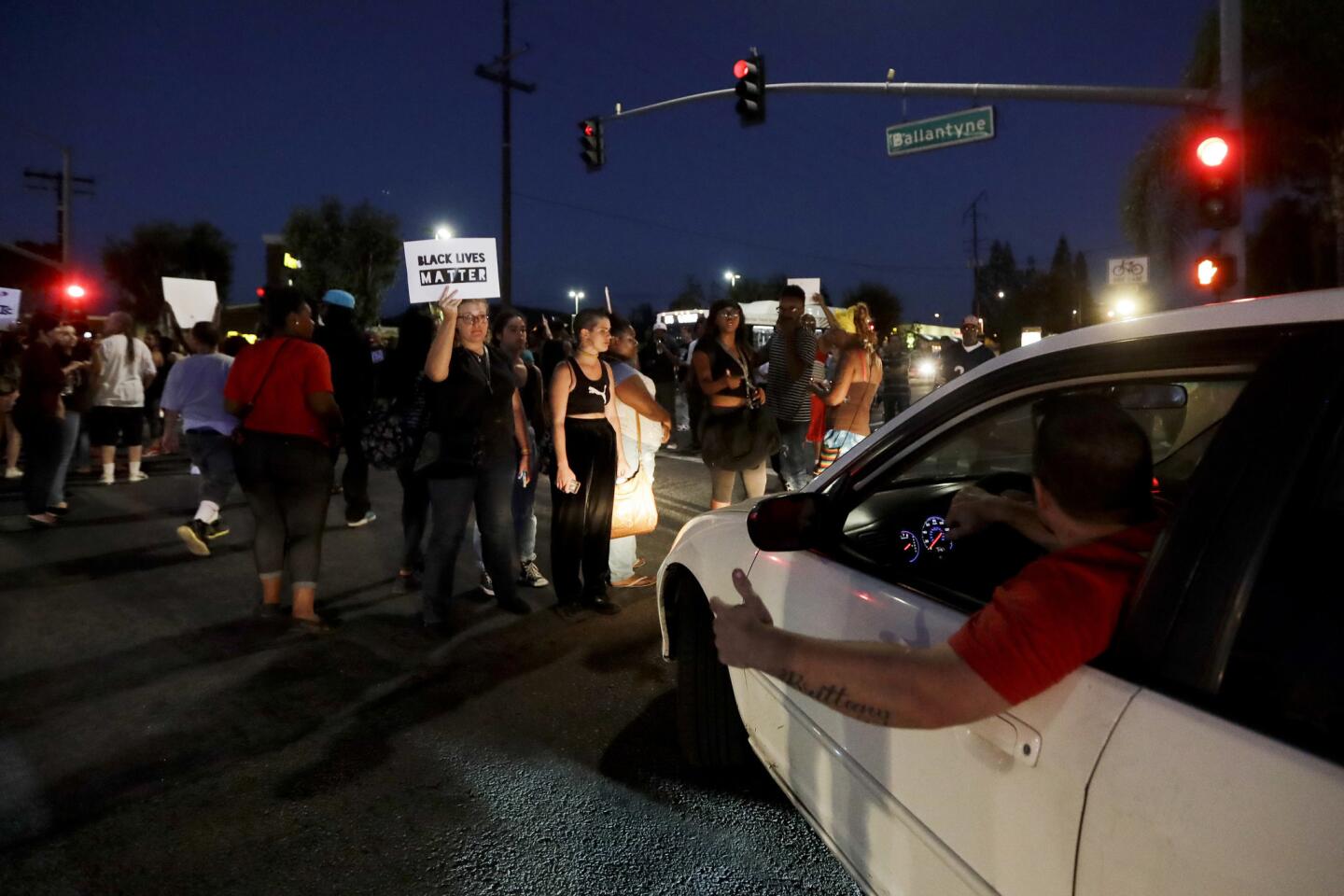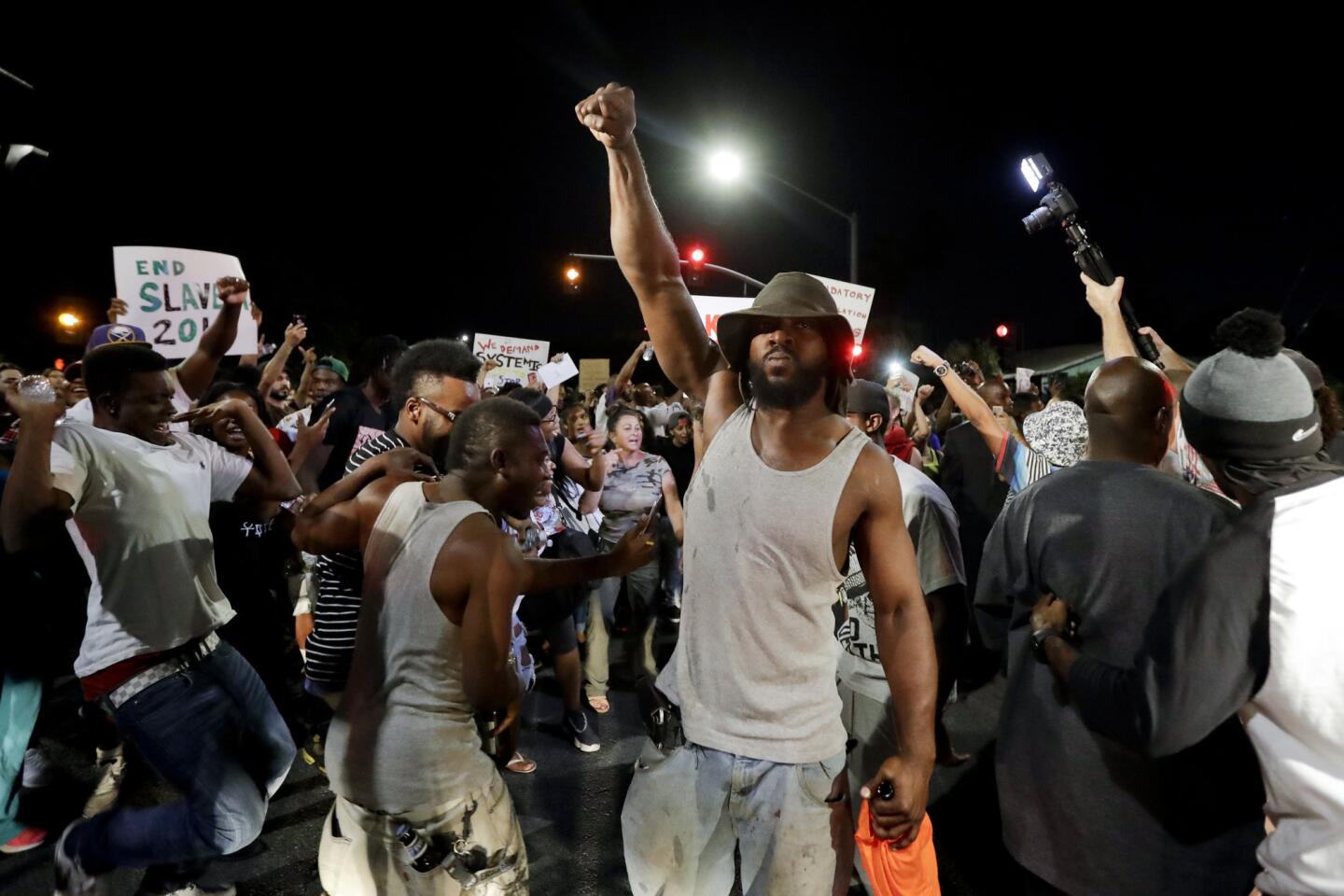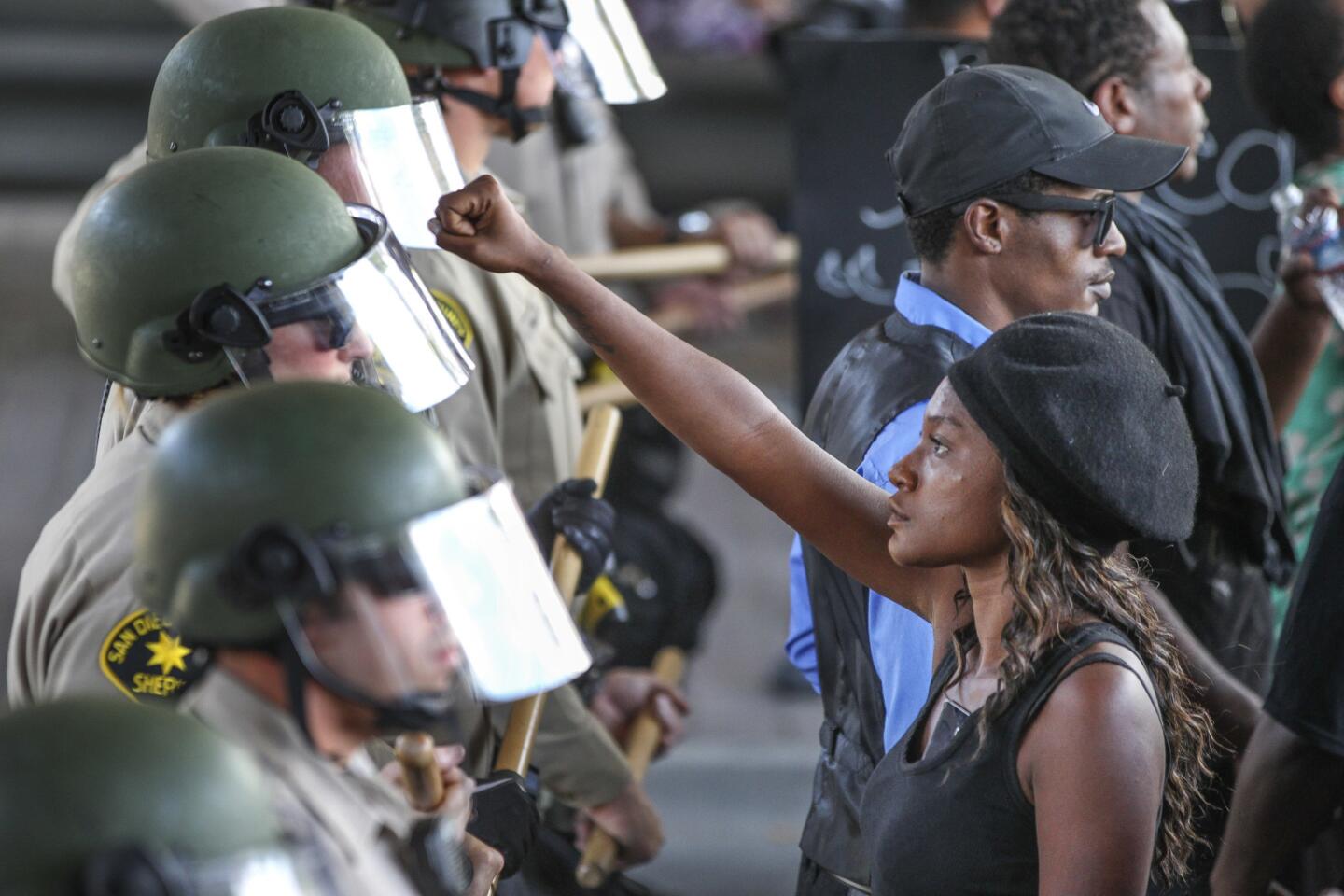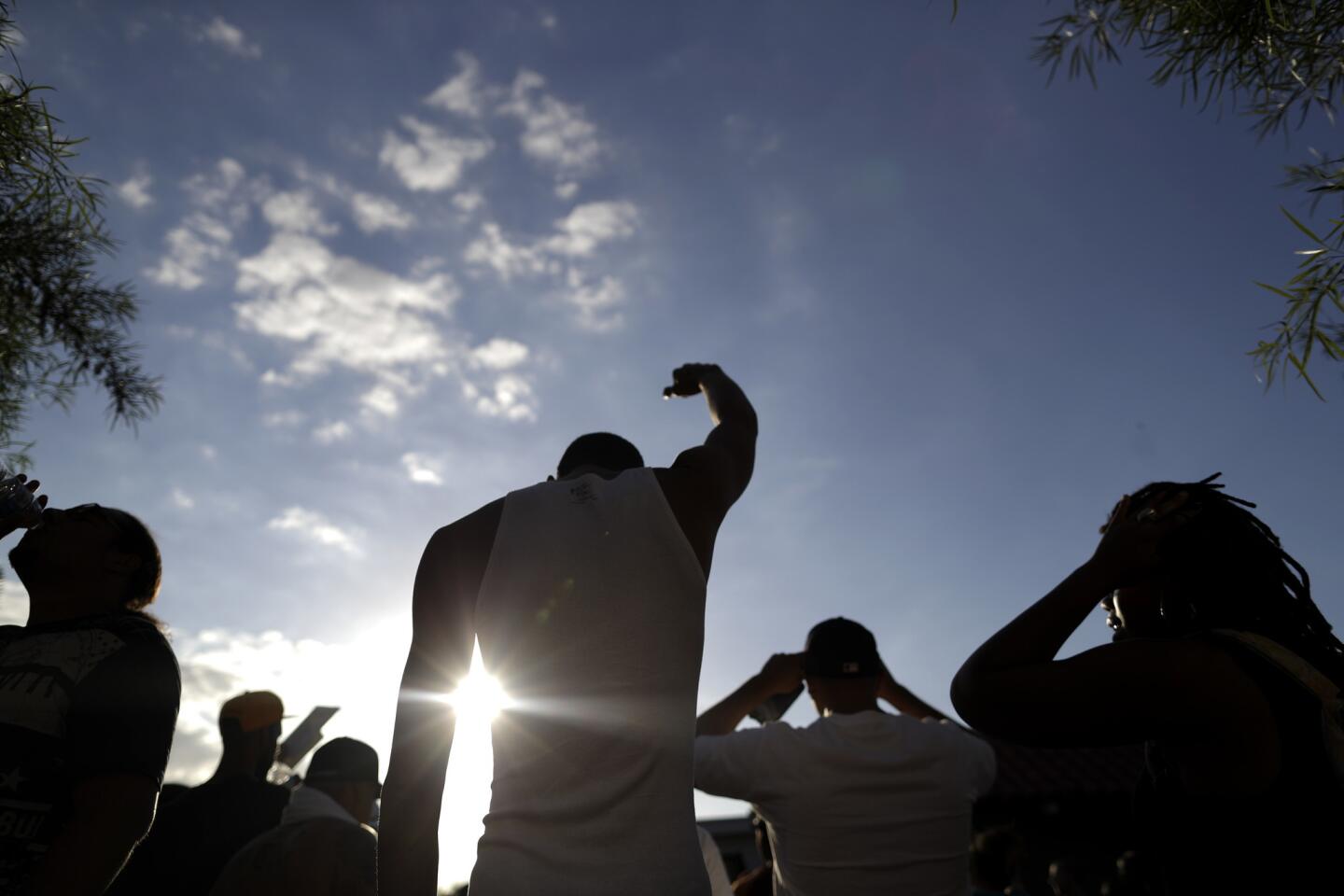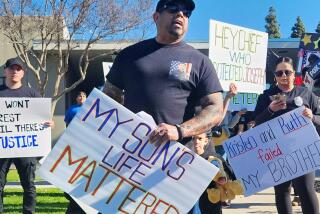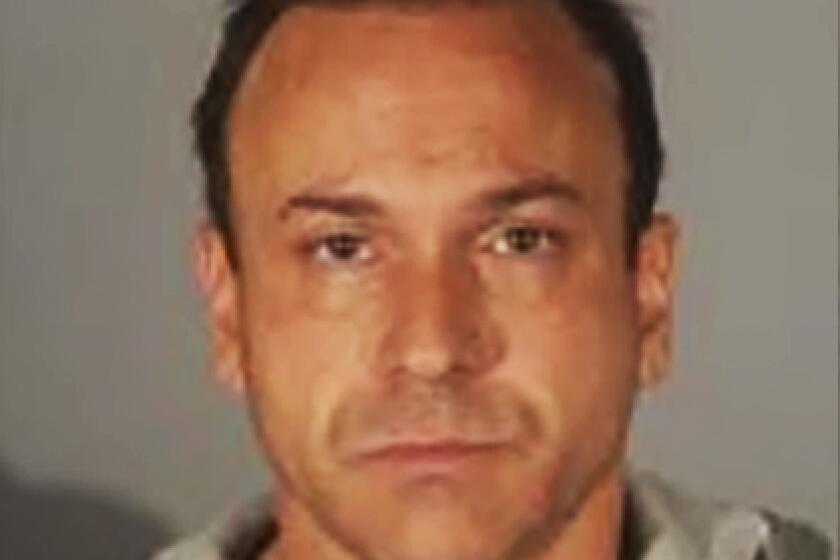El Cajon police say black man was holding vape smoking device in hand when officers fatally shot him
Reporting from El Cajon, Calif. — Just moments after an African American man was shot and killed by El Cajon police Tuesday, his sister was captured in an eyewitness video as she wept and screamed at officers, saying she told authorities her brother was mentally ill.
In the video posted on YouTube (some explicit language), the man’s sister said she told officers he was sick and needed help. She said she called police three times but instead should have called a “crisis communication team.”
“Don’t you guys have a crisis communication team to talk to somebody mentally sick?” she asked an officer.
“Why couldn’t you tase him? she asked officers. “Why, why, why, why?”
At one point, the woman yelled, “Oh, my God, you killed my brother!” several times.
“I called for help. I didn’t call you guys to kill him,” she told officers as she shrieked.

El Cajon Police Chief Jeff Davis urged the public to let the investigation unfold before making any judgments about the shooting.
Amid outrage and protests over the death of the man — identified as Alfred Okwera Olango — El Cajon’s mayor vowed a full investigation and said the FBI has joined the probe of the incident.
“The most important thing to take away from this meeting today is a tragedy occurred In El Cajon yesterday. We lost a life. Nobody wants to see the loss of a life,” Mayor Bill Wells said at a Wednesday afternoon press conference. “The family is devastated. The person who lost his life is devastated. Even the police officers involved in the shooting are devastated, and certainly the community is devastated.”
Wells also spoke of the death in personal terms. “I saw a man who was distraught, a man who was acting out like he was in great pain. I saw him get gunned down and killed. If it was my son, I would be devastated.”
Relatives had given Olango’s age as 30, but in confirming his identity Wednesday, police gave a birth date that put his age at 38.
Police Chief Jeff Davis on Tuesday urged the public to let the investigation unfold before making any judgments about the shooting.
“Now is the time for calm,” he said. “Now is the time to allow the investigation to shed light on this event and we plan to be open and transparent within the rules of the law.”
Davis said Olango’s sister called police and indicated that her brother was “not acting like himself.” He had allegedly been walking in traffic in the 800 block of Broadway before a pair of officers arrived at 2:11 p.m. Tuesday and found him behind a restaurant, Davis said.
He ignored multiple instructions from an officer and “concealed his hand in his pants pockets,” Davis said. Olango paced back and forth as the officers talked to him, then “rapidly drew an object from his front pants pockets, placed both hands together on it and extended it rapidly toward [one] officer, taking what appeared to be a shooting stance,” the chief said.
Olango, he said, pointed the object at the officer’s face. Police said Wednesday evening that the object was a vape smoking device, which officers have recovered.
“The vape has an allsilver cylinder that is approximately 1” diameter and 3” long that was pointed toward the officer,” police said in a statement.
At that point, the other officer fired a Taser and the officer who had the object pointed at him fired his handgun, striking Olango. Davis declined to say the number of shots that were fired. No firearm was found at the scene.
After the shooting, officers provided first aid until paramedics arrived and took Olango to a hospital.
A witness to the incident made a cellphone video, which was voluntarily turned over to police. The department has so far declined to release the video to the public.
A Facebook page for Alfred Olango identifies him as a head cook at a Hooters restaurant and that he is originally from Uganda. It says he went to San Diego High School and studied at San Diego Mesa College.
Hours after the shooting, protests erupted in the San Diego County city, with friends of the man’s family saying he suffers from a mental illness and did not pose a threat to the officers.
Most of the demonstrators voiced concerns that the shooting was racially motivated.
By 1 p.m. Wednesday, a crowd of roughly 100 demonstrators had marched from the police station to the scene of the shooting several blocks away, as a cordon of roughly 25 San Diego County Sheriff’s deputies stood nearby. The deputies wore riot helmets and held long wooden batons at port arms.
During the march, protesters momentarily blocked traffic at the intersection of Magnolia and Main streets downtown. As car horns honked, either in protest or frustration, the demonstrators chanted “black lives matter” and thrust their fists in the air.
Their foreheads dripping sweat under an unrelenting sun, activists held signs that read “release the 911 call” and “No justice, no peace!” — a rallying cry heard at similar protests throughout the nation.
“This stuff has been going on around the country for two years,” said JJ Balancier, 27. “Now, it’s finally hitting home. You see it in Ferguson, but now it’s in our city.”
Earlier in the day, community activists held a news conference at the police station and called on the chief to release any videos of the shooting.
The Rev. Shane Harris, president of the National Action Network in San Diego, said his organization met with family members who have called for a federal investigation into the shooting.
“We do not trust local prosecutors to investigate local police,” he said.
Bishop Cornelius Bowser, a gang interventionist at Pastor of Charity Apostolic Church, said residents are looking for procedural justice because relations between the black community and police “has been ruined already.”
“We don’t want to see a still picture,” he said. “We want to see the whole story.”
The community, he said, wants transparency.
Activists claimed that the city has a history of racism and targeting young men.
Residents are afraid, said Christopher Rice-Wilson, associate director at Alliance San Diego.
The El Cajon shooting comes amid growing national anguish over police shootings of blacks. Charlotte, N.C., was rocked by days of protests last week after police fatally shot 43-year-old Keith Lamont Scott.
The San Diego County district attorney’s office and the El Cajon Police Department are investigating the shooting.
All videos taken of the incident “so far coincide with the officers’ statements,” Davis said.
Police later released a still image from a video showing Olango in a shooting stance as he is confronted by officers.
“It’s important that the facts come out right now,” Davis said. “We are investigating facts as we know them and implore the community to be patient with us, work with us, look at the facts at hand before making a judgment.”
Pastor Miles McPherson, who joined the chief Tuesday at a news conference, urged peace because “we all want the right thing to happen, ” he said. He said the truth must come out, but in “a peaceful way.”
“This is very painful to me. It’s very personal,” said McPherson, who leads the Rock Church in San Diego. “I am black man and feel the pain on both sides every time this happens in our country.”
At the news conference Wednesday morning, Agnes Hassan, a relative, said she and Olango were in a refugee camp together before they came to the U.S. to make a better life for themselves and their children.
“We suffered too much with the war in Africa … we come here, to suffer again,” she said.
Hassan said she was heartbroken.
“What happened yesterday, it wasn’t right,” she said.
On Twitter, the department disputed some of the claims made by protesters: “The investigation just started, but based on the video voluntarily provided by a witness, the subject did NOT have his hands up in the air.”
Michael Ray Rodriguez said he was driving away from the apartment building when he said he saw a shirtless black man with his hands in the air. In a matter of seconds, he said, an officer opened fire.
The officer “shot him again and again,” Rodriguez said, adding he heard five shots.
El Cajon police officers are not equipped with body-worn cameras. The department recently completed a pilot program to test the cameras and ordered some. The equipment has not been delivered, Ransweiler said.
Both officers involved in the shooting have been working in law enforcement for more than 21 years, the police chief said.
As officials continued to investigate the incident, at least one use-of-force expert said that that Olango’s shooting stance complicated matters.
Ed Obayashi, a Plumas County, Calif., sheriff’s deputy and legal advisor, said that mental health training for officers may have been of limited value in the situation.
“When those hands come up in a shooting stance, the officer wouldn’t have time to assess whether what is in the hands is a gun,” Obayashi said. “Almost immediately, the officer sees the hands flash up into a shooting stance, he must react. A second will be too late if it’s a firearm.”
Times staff writer Parvini reported from El Cajon, Calif.; Rocha and Winton, from Los Angeles.
ALSO
Police Commission faults LAPD officers in two deadly shootings
How two police shootings of black men sent Tulsa and Charlotte in different directions
92 deaths, 2,623 bullets: Tracking every Chicago police shooting over 6 years
UPDATES:
8:20 p.m.: Updated with information about Olango’s age.
6:33 p.m. Updated with information about vape smoking device.
4:19 p.m. Updated with more from mayor.
3:50 p.m. Updated with FBI joining probe and mayor quotes.
1:10 p.m.: This article was updated with protest details.
12:20 p.m.: This article has been updated with protest details.
10:50 a.m.: This article has been updated with comments from a news conference and a use-of-force expert.
9:05 a.m.: This article has been updated with details on evidence at the scene.
8:35 a.m.: This article has been updated with the identification of the deceased man by relatives and details from his Facebook page, and with statements by his sister that she had told police he was mentally ill.
This article was originally published at 7:25 a.m.
More to Read
Sign up for Essential California
The most important California stories and recommendations in your inbox every morning.
You may occasionally receive promotional content from the Los Angeles Times.
